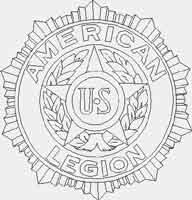 The American
Legion
The American
Legion The American
Legion
The American
Legion
By John Spivak
In the 1920s and 1930s, the Legion “was a reactionary outfit whose members were quick to use baseball bats to break up strikes and civil rights demonstrations.... [It was] born on Feb. 16, 1919, when some twenty American officers met in Paris, reportedly on orders from the commanding officers of the American Expeditionary Forces. Europe was in a revolutionary ferment which was driving the victorious nations into a fear approaching panic. Spray from the waves of this international political restlessness sprinkled American servicemen, and our high command was not happy about the effect it might have. The officers who met were wealthy men and naturally perturbed by talk of revolution. Among them were Major Hamilton Fish, Jr., who headed the first congressional committee to investigate communist activities and Grayson Murphy....[who] gave it $125,000 and... solicited contributions from other industrialists.
When industry’s efforts to reduce high wartime wage scales resulted in many strikes, veterans in Legion posts were told that the strikers were communists trying to create a chaotic situation so the Reds could take over. Such patriotic appeals to save the country brought quick responses, and in the first ten or more years of its existence the Legion developed the reputation of being a strikebreaking agency available to harried industrialists. An American Civil Liberties Union report stated: “Of the forces most active in attacking civil rights, the American Legion led the field.”
Source: Excerpt, A Man in His Time, 1967.
He [General Butler] kept up a running attack on the conspirators night after night [on radio broadcasts], revealing facts that had been omitted in the official committee report. In another broadcast he lashed out at the American Legion with no holds barred:
Do you think it could be hard to buy the American Legion for un-American activities? You know, the average veteran thinks the Legion is a patriotic organization to perpetuate the memories of the last war, an organization to promote peace, to take care of the wounded and to keep green the graves of those who gave their lives.
But is the American Legion that? No sir, not while it is controlled by the bankers. For years the bankers, by buying big club houses for various posts, by financing its beginning, and otherwise, have tried to make a strikebreaking organization of the Legion. The groups-the so-called Royal Family of the Legion - which have picked its officers for years, aren't interested in patriotism, in peace, in wounded veterans, in those who gave their lives. . . No, they are interested only in using the veterans, through their officers.
Why, even now, the commander of the American Legion is a banker-a banker who must have known what [Gerald] MacGuire's money was going to be used for. His name was mentioned in the testimony. Why didn't they call Belgrano and ask him why he contributed?
(Excerpt from a Butler broadcast over WCAU in February, 1935)
Butler was incredulous when he read that Colonel William F. Easterwood, national vice-commander of the Legion, while visiting Italy in 1935, had pinned a Legion button on Mussolini, making him an "honorary member," and had incited the dictator to the next Legion convention in Chicago.
Why, Butler wondered, did the Legion membership stand for such an abuse of the organization in their name? Apparently an uproar of sorts did break out, because Mussolini's honorary membership was later canceled as "unconstitutional" on grounds that the Legion had no honorary members.
"You know very well that it (the American Legion) is nothing but a strike-breaking outfit used by capital for that purpose, and that is the reason we have all those big clubhouses and that is the reason I pulled out of it. They have been using the dumb soldiers to break strikes."
Testimony before House of Representatives' Committee, Investigation of Nazi and Other Propaganda. 1935
...In fairness to the American Legion today, it needs to be pointed out that the Legion leadership of our times is far different from what it was in the period during and preceding the Butler hearings, when so many former commanders and high officials were involved in the conspiracy and antilabor actvities dictated by big-business interests.
John L. Spivak explained why:
A long struggle followed within the Legion between those who would use the members for their own business and political interests and those who wanted the organization used for the benefit of former servicemen. The latter won. At the time of the plot, the cleavage between the rank and file and the Royal Family seemed-as it indeed turned out to be-a permanent one. In the generation that followed, the Legion underwent drastic changes and a mellowing.
Members now rarely participate in antilabor activity. In fact, many Legionnaires are themselves loyal union men.
Source: Jules Archer, The Plot to Seize the White House, 1973.
Source: Press for Conversion! magazine, Issue # 53, "Facing the Corporate Roots of American Fascism," March 2004. Published by the Coalition to Oppose the Arms Trade.
Order a Copy: Order a hard copy of this 54-page issue of Press for Conversion! on the fascist plot to overthrow President F.D.Roosevelt and the corporate leaders who planned and financed this failed coup.